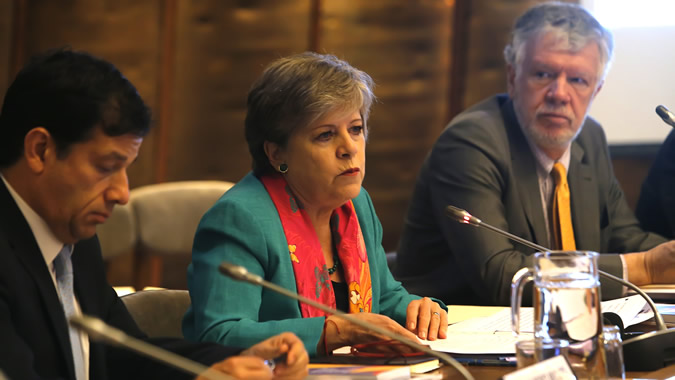Briefing note
Vice-presidents, ministers and vice-ministers of finance from several Latin American and Caribbean countries attending a seminar at ECLAC headquarters in Santiago, Chile, today called for fiscal responsibility to be maintained in order to promote growth and equality, particularly in light of the current complex economic and political context.
The officials and other international experts were attending the Twenty-ninth Regional Seminar on Fiscal Policy, which is to run until tomorrow, Friday 24 March. Organized by ECLAC, the meeting is also supported by the International Monetary Fund (IMF), the Inter-American Development Bank (IDB) and the Organization for Economic Cooperation and Development (OECD), with sponsorship from the Spanish International Development Cooperation Agency (AECID) and the Norwegian Ministry of Foreign Affairs.
The event, which has evolved into a reference point in fiscal discussions for authorities, policymakers, economists and academics from across Latin America and the Caribbean, was inaugurated by Alicia Bárcena, Executive Secretary of ECLAC, Beate Stirø, Ambassador of the Kingdom of Norway to Chile, Rolf Schulze, Ambassador of the Federal Republic of Germany to Chile, and Alejandro Micco, Chile’s Undersecretary of Finance.
“In addition to the complex external scenario, the region is facing such structural problems as falling public and private investment, stagnated productivity, persistent inequality, low tax revenues and the poverty that still affects 175 million people in Latin America and the Caribbean,” said Alicia Bárcena.
“The challenge of returning to a path of more accelerated growth and addressing the current circumstances brings pressure to bear on national fiscal policies. Along with increased household spending and private investment, public investment and social protection policies must be bolstered,” she added.
The Ambassador of the Kingdom of Norway in Chile, Beate Stirø, underscored the importance of investing in education to reach all sectors of society. “The 2030 Agenda and its Sustainable Development Goals (SDGs) define the road map for the future we want. Meeting its targets requires a well-educated population and better employment opportunities,” she said.
In turn, the Ambassador of the Federal Republic of Germany in Chile, Rolf Schulze, said that cooperation is essential for strengthening fiscal policies and institutions in the region, while tax incentives could accelerate reforms in the private sector to help reach the targets set. “Fiscal policy is one of the key elements in attaining the 2030 Agenda. It is an effective tool for supporting sustainable development processes and economic transformation in order to help bring about more equitable societies,” he said.
Alejandro Micco, Chile’s Undersecretary of Finance, stressed that fiscal responsibility was not a trivial matter, but rather something that had to be preserved to ensure greater well-being for the population. “Countries that are more fiscally responsible enjoy greater long-term progress and a better quality of life for their citizens. We must maintain fiscal discipline and efficient and transparent tax systems to prevent evasion and avoidance,” he said.
The first day of the Twenty-ninth Regional Seminar on Fiscal Policy included a high-level panel session on the challenges of fiscal policy in the prevailing national, regional and global circumstances. Addresses were given by Alejandro Micco; Helio Fallas, First Vice-President and Minister of Finance of Costa Rica; Wilfredo Cerrato, Minister of Finance of Honduras; Luis Arce, Minister of the Economy and Public Finance of Bolivia; Sebastián Galiani, Vice-Minister and Secretary for Economic Policy at the Ministry of Finance of Argentina; Pedro Jucá Maciel, Undersecretary of the National Treasury at Brazil’s Ministry of Finance; and Pablo Ferreri, Undersecretary for the Economy and Finance of Uruguay.
ECLAC Executive Secretary Alicia Bárcena also presented the report Fiscal Panorama of Latin America and the Caribbean 2017, in which the organization calls for careful stewardship of public spending and investment in the current economic context to bolster growth, innovation and technological change and to deal with climate change.
The event also saw the launch of the report Revenue Statistics in Latin America and the Caribbean, a joint publication of the OECD, ECLAC, IDB and the Inter-American Center of Tax Administrations (CIAT), which indicates that tax revenues in Latin America and the Caribbean continued to rise in 2015 in spite of slow economic growth.


